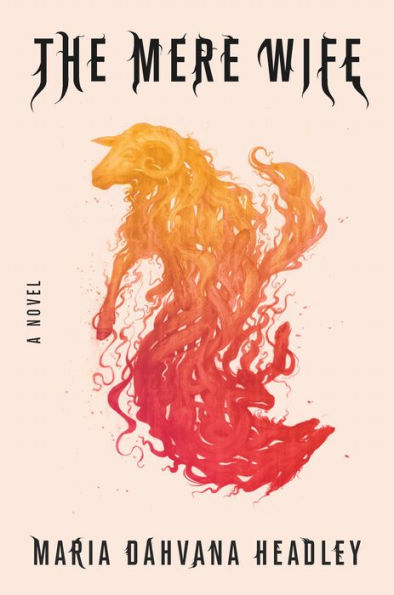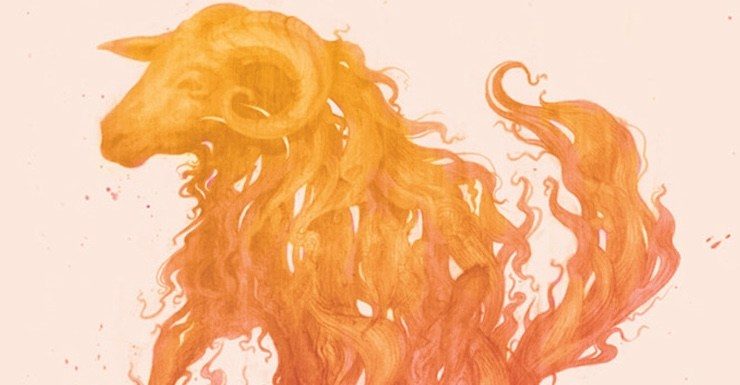Hwaet!
Maria Dahvana Headley’s The Mere Wife has finally been loosed upon the world. I say finally because I think the world needs this book. In Headley’s hands, Beowulf is revealed to be the perfect story to bring forward from the depths of Western history. Headley has turned it over, poked its squishy underbelly, asked it a bunch of questions, and come out with an entirely new version of the tale, exploring new perspectives and revealing truths new and old.
It’s also a great, heart-wrenching read.
Buy the Book


The Mere Wife
If you’ve read Beowulf you probably remember the basic story, but maybe not the ending. The hall of Hrothgar, mighty king, is being besieged by a monster named Grendel. The mighty warrior Beowulf comes, pulls Grendel’s arm off, and he dies. Grendel’s mother, also a monster, comes in vengeance. Beowulf slays her, too. The people love him and feel safe, and after he goes home he become king of the Geats. He reigns in prosperity for a long time, and then goes out on one last job to slay a dragon. In the end, he and the dragon slay each other in battle, so the land is rid of dragons, and the old warrior king gets to go out in battle rather than sleeping in his bed.
This is one of the oldest stories in Western culture. It’s been remixed and re-translated many times. It shows up as the surprise plot of the (surprisingly great) film The Thirteenth Warrior. It was adapted by Neil Gaiman into a movie that doesn’t always work but is always interesting. John Gardner rewrote it as a spiritual autobiography of the monster in Grendel, during that paroxysm of culture when Western writers were trying to find ways to retell the old stories from new perspectives.
Always, though, Grendel remained a monster. So did his mom—in Gardner’s version she can’t even really speak. And Hrothagar’s nubile young wife, Wiltheow, remained a trophy, first for Hrothgar, then for Beowulf—a sign of youth and fertility. If she was kept safe, the kingdom was safe.
Would you like to know the one scene I remember from reading Grendel in high school? The monster has crept down to Hrothgar’s hall, and spies on the human lives within. He sees Wiltheow preparing for bed. She’s been offered to him as a bride, in the hopes of appeasing his murderous tendencies. And when she lays down he sees a single tear of blood creeping out onto her thighs—not from any sort of violence, but from her period. She is fertile. She is also a monster—this thing that bleed for days yet does not die.
You can imagine me reading this as a high school student, female adjacent, feeling my own monstrosity and fucking reveling in it, most of the time. Imagine me, with my Tim Burton fandom and my Manic Panic hair and my desperate yearning love of Television.
In her scorched earth comedy special, Nanette, Hannah Gadsby specifically excoriates Pablo Picasso for claiming to show us new perspectives in his art when in actuality he was just showing us the same old shit: naked women, held up for the consumption of men. Go to any art museum and that’s what you’ll see, century upon century of men, painting thousands of variations on naked women. To the extent that the naked woman became so entwined in our idea of what art is, that when the feminist artist Judy Chicago made “The Dinner Party,” she took centuries of groundbreaking women and served their vaginas up on so many platters. This was revolutionary – a woman showing us stylized, abstract visions of women, honoring their lives and thoughts and names –but they were still vaginas. If those women had been born men (and white and high class enough to matter) Chicago wouldn’t have needed to honor them with vagina plates because portraits of their fucking faces would have already hung in galleries around the world. As Gadsby points out, when Picasso shattered perspective and showed us movement from every angle, all of the perspectives were still through his eyes, his brain, his male culture, his belief that a woman could be in her prime at 17. Gadsby was 17 when she studied Picasso, and discovered that this great artist didn’t even rate her as human.
I was 17 when I read Grendel, and saw myself in that monstrous drop of blood.
Consider these paragraphs my own sort of HWAET so when I tell you that The Mere Wife is water in a fucking desert, you’ll listen, and understand what I’m saying.
The book, in many ways, is an extremely faithful retelling of Beowulf. Grendel and his mother live in what’s left of the wilderness on a mountain above Herot Hall. Hrothgar is a leader of men, his wife is a trophy, and Beowulf is a warrior. In this case, Herot Hall is a gated community, Hrothgar is Roger Herot, wealthy and successful plastic surgeon, his trophy wife, Willa, is a former actress who now spends her life hosting playdates and dinner parties, and leading the other community wives in performing glistening lives in front of floor-to-ceiling picture windows that show everything. Beowulf is Ben Woolf, former Marine, current small town cop.
And Grendel? He’s a boy. He might be part monster, or part god. His mother, Dana, went to war and came back pregnant. And here’s the first knife twist. The word usually used for Grendel’s mother? In the Old English it’s aglæca. Aglæca—the same word that’s used for Beowulf, means warrior, not monster.
So why has Grendel’s mother been a monster for century upon century?
Why, when Gardner chose to tell the story from the monster’s perspective, did he take her speech away? And why did he find a second monster sleeping beside Hrothgar?
This, the line between monster and warrior, between woman and monster, is the question of the book.
The trouble begins when Grendel befriends Roger and Willa’s boy, Dylan. Neither of them sees the other as a monster, they’re just two boys tumbling through life, giving each other gifts and showing their love through violence and tenderness in equal measure.
And it’s here that we get a sense of a real perspective shift. Roger Herot expects, like a proper white man, that his word will be obeyed. When the monsters don’t obey he’s at a loss. Ben Woolf, the solid military man, expects that his might will be obeyed. But how can it, when his strength is met not by a teenage shoplifter or suburban vandal, but by a fellow warrior? And so the book focuses on the two who offer us something new: Willa and Dana. Is there depth beneath the veneer of the trophy wife? Headley would argue that there is. Willa, with all of her faults and compromises, becomes very real over the course of the book. So then, is the warrior woman a monster, or just a terrified mother hitting the limits of her strength? Headley would ask why we scream Monster! at Dana, but Hero! at Ben Woolf, when the line between the two is this as razor wire.
Headley’s prose is as fluid and florid as Old English was guttural. Headley never shies away from violence or horror, but she shatters it into the tiny shards we experience—you know, like a Picasso?—flashes of pain and moments of joy. When a character is overwhelmed or disoriented, so are you, the reader. When she means to put you behind a character’s eyes, that’s where you are. She begins each section with a different translation of the word Hwaet! working her way through Listen, So, What, Hark, Attend, Yes, etc. It’s astonishing to watch the way one small word changes the meaning of each section, all the different emotions that can be wrung from sound. I don’t often use words like delicious when I read, but this book deserves to be rolled around in the mouth.
Listen. Long after the end of everything is supposed to have ocurred, long after apocalypses have been calculated by cults and calendared by computers, long after the world has ceased believing in miracles, there’s a baby born inside a mountain.
Earth’s a thieved place. Everything living needs somewhere to be.
There’s a howl and then a whistle and then a roar. Wind shrieks around the tops of trees, and sun melts the glacier at the top of the peak. Even stars sing. Boulders avalanche and snow drifts, ice moans.
No one needs to see us for us to exist. No one needs to love us for us to exist. The sky is filled with light
The world is full of wonders.
The book shifts tone constantly, so at times you’re reading a satire that turns into an adventure novel that veers left into horror that can, at times, feel almost romantic. But the majority of the book is dedicated to a critique of suburban culture—specifically the way a particular type of class-obsessed suburbia can suck all the meaning out of a woman’s life. If you buy into the stay-at-home-wife lifestyle, you find yourself doing the same chores over and over, relentlessly, waving goodbye to a husband who marches off to work and children who skip off to school. The husband’s life, even in a boring office job, will at least involve new people and new tasks. The kids’ lives, even during a boring day at school, will hopefully contain friends and at least some intellectual stimulation. But you? You’re cleaning the same floors, running the same dishwasher, spraying stain remover on the same soccer shorts. No matter what you plan for your day 4:30 comes too soon, and there is dinner to start, your husband’s cocktail to prep. This is Willa Herot’s life, sliding along beside Dana’s life. Dana, up the mountain, teaching her Gren to hunt, and to hide from the eyes of men.
How do we define the word warrior? What is the line between warrior and monster?
Is Willa a warrior, in her SUV and her armor of perfect fashion? Is Dana a warrior or a maniac, with her desire to protect her child at all costs? Do these women become monsters when they try to defend their children, or are they simply enacting the purest ideals of American culture? Is one woman a monster and the other a hero?
To go back to perspectives for a moment, Headley even chooses to write from the Mere’s point of view a few times. An ancient collective voice of Nature itself, watching the silly lives of silly humans. But just as in Gadsby’s Nanette, there’s even meaning in the title: is the Mere a being itself? Is Dana the Mere’s wife? Is Willa merely a wife, as Roger seems to believe? And how can a wife be “mere” when the Old English wif means woman? There are no “mere” women any more than there are “mere” men.
I love a book that asks more questions than it answers. I love a book that wrestles me, and makes me think about it after I’ve finished it. If you enjoy battling monsters, I can’t recommend this book enough.
Leah Schnelbach is happy in her monstrosity. Come join her in the mere of Twitter!










